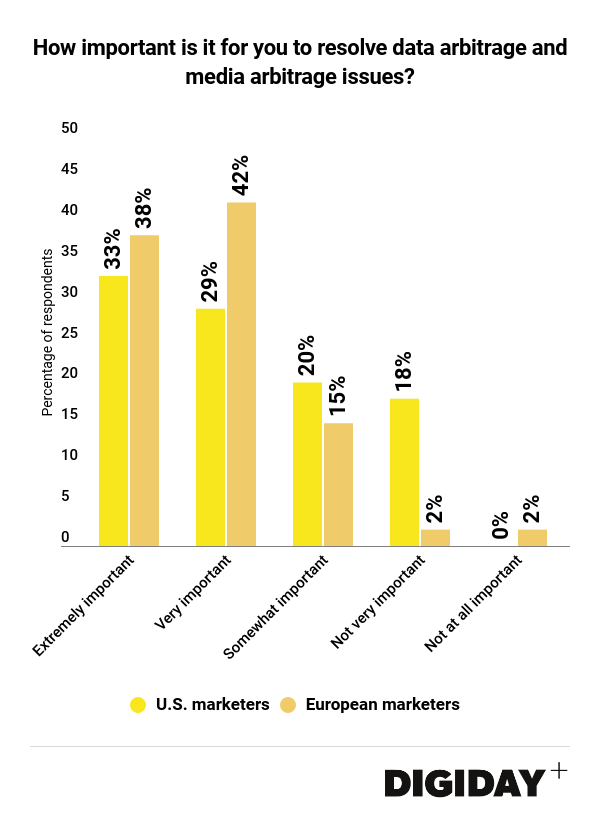Digiday Research: European marketers are more concerned than Americans about data arbitrage

This research is based on unique data collected from our proprietary audience of publisher, agency, brand and tech insiders. It’s available to Digiday+ members. More from the series →
The damning Association of National Advertisers report on agency transparency in the U.S. in 2016 and the domain-spoofing scandals at the Financial Times and News UK illustrate the lack of transparency in programmatic media buying in the U.S. and Europe. That murkiness allowed unscrupulous practices such as media arbitrage and data arbitrage to flourish.
Buy-side marketers are finally realizing arbitrage’s harms and starting to take action. In a survey of 98 marketing executives at the Digiday Programmatic Marketing Summits in New Orleans and Portugal earlier this year, the majority of U.S. marketers and European marketers — 62 percent and 80 percent, respectively — agreed that combating data arbitrage and media arbitrage is important.

The attitudes of U.S. marketers match the global sentiment among marketers about data arbitrage, according to a World Federation of Advertisers study published in February. The report found that addressing data arbitrage in 2018 was a major priority for 62 percent of the marketers, up from 14 percent in 2017, demonstrating how quickly the digital media industry is adjusting to combat this problem.
A reason why more European marketers than U.S. marketers believe addressing arbitrage is a priority is that Europeans in general have always been more concerned than Americans about online data privacy. That’s manifested itself in the recently implemented General Data Protection Regulation, which levies heavy fines for improperly using consumer data, so marketers are less incentivized to purchase marked-up data from agencies without guarantees that the data complies with GDPR. In fact, programmatic buying based off third-party data has already decreased since GDPR’s enforcement.
One way marketers can fight media arbitrage is ads.txt, which emerged as powerful tool for marketers to find verified sellers of publisher inventory and avoid arbitraged inventory. Concrete numbers are hard to come by, but ads.txt adoption is growing worldwide. Marketers can also improve communication problems. Marketers have a limited understanding of the digital supply chain, and until they meet with their vendors and publisher partners to understand how they expose themselves to arbitrage, they won’t be able to resolve it.
More in Marketing

YouTube’s upmarket TV push still runs on mid-funnel DNA
YouTube is balancing wanting to be premium TV, the short-form powerhouse and a creator economy engine all at once.

Digiday ranks the best and worst Super Bowl 2026 ads
Now that the dust has settled, it’s time to reflect on the best and worst commercials from Super Bowl 2026.

In the age of AI content, The Super Bowl felt old-fashioned
The Super Bowl is one of the last places where brands are reminded that cultural likeness is easy but shared experience is earned.





